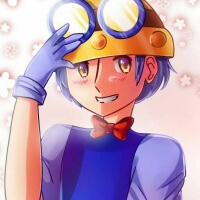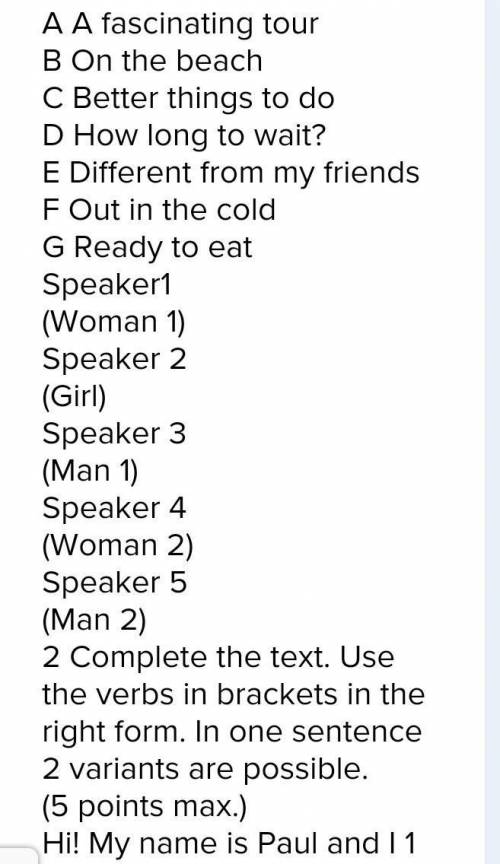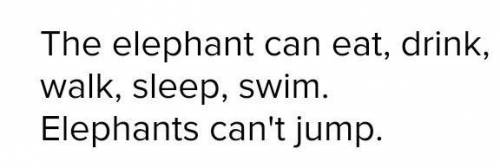5 Read the mini-dialogues. Transform direct questions into indirect. Complete the gaps in the answers with suitable words. (10 points max.) 0. Where does your family usually stay on holiday? Could you tell me where your family usually stays on holiday? It depends. It can be a hotel or a room to rent. It can be hard to find accommodation when you are on holiday. 1. How do you prefer to travel? - By train. It's comfortable and doesn't take too much time. For example, my from Moscow to St Petersburg takes just 4 hours. - Why are you smiling? 2. - person. I'm always in a good mood — I'm a very 3. What kind of music do you like? about jazz and pop. As for me, I'm absolutely 4. Why do you enjoy historical novels? - - - There's usually a love story there, and I'm so 5. What does your brother do about the house? He washes up and cleans his room. That's how he earns his
Ответы на вопрос:
mikhail lomonosov (19.11 (08.11. o.s.) 1835 - 15.04.(04.04. o.s.) 1765) - russian poet and scientist.
lomonosov was the son of a poor fisherman. at the age of 10 he too took up that line of work. when the few books he was able to obtain could no longer satisfy his growing thirst for knowledge, in december 1730, he left his native village, penniless and on foot, for moscow. his ambition was to educate himself to join the learned men on whom the tsar peter i the great was calling to transform russia into a modern nation.
the clergy and the nobility, attached to their privileges and fearing the spread of education and science, actively opposed the reforms of which lomonosov was a lifelong champion. his bitter struggle began as soon as he arrived in moscow. in order to be admitted to the slavonic-greek-latin academy he had to conceal his humble origin; the sons of nobles jeered at him, and he had scarcely enough money for food and clothes. but his robust health and exceptional intelligence enabled him in five years to assimilate the eight-year course of study; during this time he taught himself greek and read the philosophical works of antiquity.
noticed at last by his instructors, in january 1736 lomonosov became a student at the st. petersburg academy. seven months later he left for germany to study at the university of marburg, where he led the turbulent life of the german student. his work did not suffer, however, for within three years he had surveyed the main achievements of western philosophy and science. his mind, freed from all preconception, rebelled at the narrowness of the empiricism in which the disciples of isaac newton had bound the natural sciences; in dissertations sent to st. petersburg, he attacked the problem of the structure of matter.
in 1739, in freiberg, lomonosov studied firsthand the technologies of mining, metallurgy, and glassmaking. also friendly with the poets of the time, he freely indulged the love of verse that had arisen during his childhood with the reading of psalms. the "ode," dedicated to the empress, and the pismo o pravilakh rossiyskogo stikhotvorstva ("letter concerning the rules of russian versification") made a considerable impression at court.
after breaking with one of his masters, the chemist johann henckel, and many other mishaps, among which his marriage at marburg must be included, lomonosov returned in july 1741 to st. petersburg. the academy, which was directed by foreigners and incompetent nobles, gave the young scholar no precise assignment, and the injustice aroused him. his violent temper and great strength sometimes led him to go beyond the rules of propriety, and in may 1743 he was placed under arrest. two odes sent to the empress elizabeth won him his liberation in january 1744, as well as a certain poetic prestige at the academy.
while in prison he worked out the plan of work that he had already developed in marburg. the 276 zametok po fizike i korpuskulyarnoy filosofi ("276 notes on corpuscular philosophy and physics") set forth the dominant ideas of his scientific work. appointed a professor by the academy in 1745, he translated christian wolff's institutiones philosophiae experimentalis ("studies in experimental philosophy") into russian and wrote, in latin, important works on the meditationes de caloris et frigoris causa (1747; "cause of heat and cold"), the tentamen theoriae de vi aлris elastica (1748; "elastic force of air"), and the theoria electricitatis (1756; "theory of electricity"). his friend, the celebrated german mathematician leonhard euler, recognized the creative originality of his articles, which were, on euler's advice, published by the russian academy in the novye kommentari.
Реши свою проблему, спроси otvet5GPT
-
Быстро
Мгновенный ответ на твой вопрос -
Точно
Бот обладает знаниями во всех сферах -
Бесплатно
Задай вопрос и получи ответ бесплатно

Популярно: Английский язык
-
Выберите правильный ответ в скобках ...
 Ксюша007111122.08.2022 03:54
Ксюша007111122.08.2022 03:54 -
Составить правильные предложения. 1) represented, yesterday,...
 РОДЯ4512.01.2022 09:48
РОДЯ4512.01.2022 09:48 -
22 Listen and circle. All about VOLGANOES! The word volcano comes...
 Sobakopes11.11.2022 04:39
Sobakopes11.11.2022 04:39 -
Привет всем нужна Кому не сложно. Очень мало времени. Буду очень...
 Rikrbrujrh11.11.2021 18:45
Rikrbrujrh11.11.2021 18:45 -
friends? Use the Present Perfect. Ron - do pantomime? - How long...
 нура4928.04.2020 14:09
нура4928.04.2020 14:09 -
Переведите: listen and repeat. then talk with your friend....
 gennadih9015.04.2023 16:38
gennadih9015.04.2023 16:38 -
Надо на вопросы ответить 1. what will you taste at the oriental...
 ajamshid1976p042ct03.12.2020 06:22
ajamshid1976p042ct03.12.2020 06:22 -
Нужно написать текст 6 предложений на языке тема мой любимый...
 Хаурма714.04.2023 23:04
Хаурма714.04.2023 23:04 -
Write about your past states or habits when you were a child...
 danabekzanova20.05.2020 11:35
danabekzanova20.05.2020 11:35 -
Как образованы времена present simple, present continuous,present...
 Infinity16721.01.2020 04:06
Infinity16721.01.2020 04:06

Есть вопросы?
-
Как otvet5GPT работает?
otvet5GPT использует большую языковую модель вместе с базой данных GPT для обеспечения высококачественных образовательных результатов. otvet5GPT действует как доступный академический ресурс вне класса. -
Сколько это стоит?
Проект находиться на стадии тестирования и все услуги бесплатны. -
Могу ли я использовать otvet5GPT в школе?
Конечно! Нейросеть может помочь вам делать конспекты лекций, придумывать идеи в классе и многое другое! -
В чем отличия от ChatGPT?
otvet5GPT черпает академические источники из собственной базы данных и предназначен специально для студентов. otvet5GPT также адаптируется к вашему стилю письма, предоставляя ряд образовательных инструментов, предназначенных для улучшения обучения.





